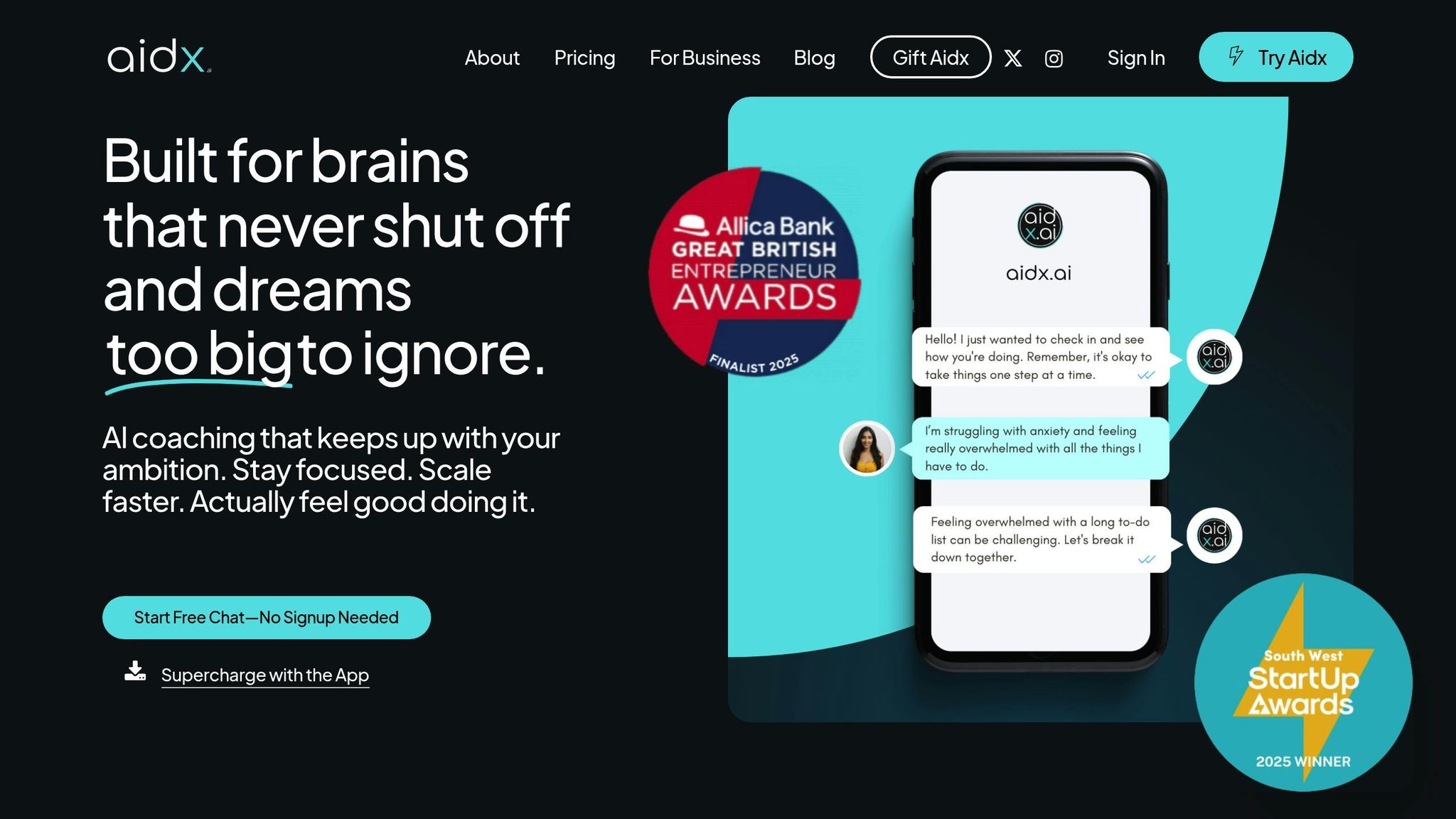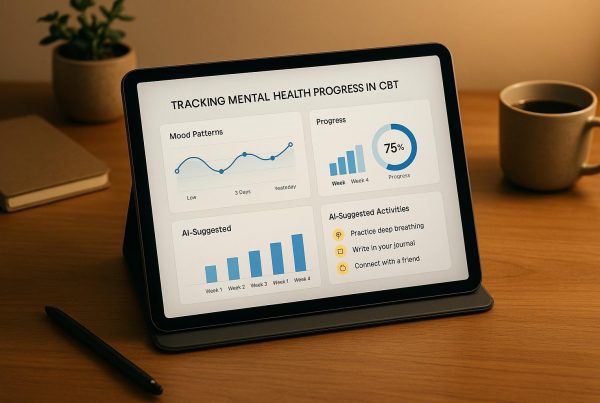Breaking habits is tough, but combining AI with Cognitive Behavioral Therapy (CBT) makes it easier. Here’s how:
- Habits are automatic behaviors triggered by cues, repeated through routines, and reinforced by rewards. Your brain resists change because habits activate its reward centers.
- CBT helps by identifying triggers and replacing harmful habits with healthier alternatives, focusing on the link between thoughts, emotions, and actions.
- AI enhances CBT by providing real-time, personalized support. It tracks your behavior, suggests immediate interventions, and adapts strategies to your needs.
- Tools like Aidx.ai integrate planning, self-monitoring, and voice-enabled coaching, offering 24/7 assistance to break habits effectively and discreetly.
AI-driven CBT complements human therapists, offering accessible, instant, and cost-effective solutions for habit change while leaving complex emotional issues to professionals.
THIS AI Is Helping People Quit Addiction – You Need To See This
How AI Improves CBT Techniques for Habit Breaking
Traditional Cognitive Behavioral Therapy (CBT) offers a reliable foundation for understanding and shifting habits. But when paired with AI, these techniques evolve into more dynamic and personalized experiences. AI doesn’t replace the core principles of CBT – it enhances them, making interventions more precise, accessible, and impactful.
Let’s explore how AI’s personalization, real-time feedback, and voice-enabled coaching are reshaping CBT for habit-breaking.
Personalized Interventions with Adaptive AI
One of AI’s biggest contributions to CBT is its ability to tailor interventions to individual behavior patterns. Adaptive AI builds on CBT principles, ensuring that strategies align with your unique needs and circumstances.
"AI-driven, personalized protocols pioneer efficient habit modification. By combining insights from neuroscience, advanced data analytics, and real-time feedback systems, these technologies can help people build better habits more efficiently, enjoyably, and sustainably." – Narotam Singh, Neuroscience & AI Insights [1]
AI systems continuously adjust in real time, making their guidance consistently relevant. For instance, if you’re working to overcome stress-eating, the AI can detect when your stress levels rise and immediately recommend coping strategies tailored to your situation.
The effectiveness of this personalized approach is backed by research. A 2024 UCSF study revealed that AI-powered CBT exercises reduced depression symptoms by 22% within two months [2]. Participants also reported a 31% decrease in anxiety symptoms and a 67% improvement in emotional regulation over eight weeks [2].
Aidx.ai’s Adaptive Therapeutic Intelligence (ATI) System™ takes this customization even further. By incorporating evidence-based techniques from CBT, DBT, ACT, NLP, and performance coaching, the system adapts to your emotional state, goals, and interaction history. Over time, it creates a therapeutic experience that feels as intuitive and supportive as working with a human therapist.
Real-Time Feedback and 24/7 Support
Traditional therapy often leaves gaps between sessions, but habits don’t wait for appointments. AI bridges this gap by offering constant availability and real-time feedback [3].
This around-the-clock support is critical. Globally, one in ten people aged 5 to 24 – roughly 293 million individuals – struggle with mental health challenges. Mental disorders account for over 418 million disability-adjusted life years and impose an economic burden of about $5 trillion [3].
AI-powered tools provide immediate responses, allowing you to address challenges as they arise. Instead of waiting weeks to discuss setbacks, you can process and manage emotions in the moment. For example, AI can suggest actionable steps like breathing exercises or thought-reframing techniques to counter negative patterns [2].
Studies show these tools can significantly reduce depression symptoms within two weeks and improve anxiety levels within 8–12 weeks [4]. The immediacy of AI’s support ensures that you’re not facing challenges alone, no matter when they occur.
Voice-Enabled Coaching for Easy Integration
Voice-enabled AI takes accessibility to the next level, making therapeutic support feel as natural as chatting with a supportive friend. Beyond real-time assistance, voice technology fosters a deeper emotional connection and removes common barriers to engaging with therapy.
What sets voice AI apart is its ability to interpret vocal tones and modulations, tracking mood and providing interventions based on subtle emotional cues [5]. This means the AI doesn’t just listen to your words – it understands how you’re feeling.
"For the first time, voice-driven AI technologies and our understanding of the voice as a signal for mental health are powerful enough to provide empathetic, non-judgmental, and human-like support to the many people who have found conventional methods less effective or accessible." – Jeffrey Brooks, Hume AI [5]
The hands-free nature of voice interaction makes it especially helpful for habit-breaking. Whether you’re walking, driving, or cooking, you can access therapeutic tools without interrupting your routine. In fact, 27% of U.S. adults already use voice assistants for hands-free navigation, signaling a growing comfort with this technology [6].
Aidx.ai leads the way with its fully developed voice-enabled system, offering on-demand mental health and performance coaching. This innovation ensures that support is always within reach, even during those critical moments when habits are most likely to surface.
Voice interaction also helps combat feelings of isolation – a key concern, as 60% of Americans report regularly feeling isolated [7]. With voice-enabled coaching, you can practice CBT techniques like thought challenging, emotional identification, and behavioral analysis in real time. This transforms CBT from a scheduled activity into a seamless part of your everyday life, reinforcing its role as a constant companion in your journey to change habits.
Breaking Habits with AI and CBT: Core Strategies
Understanding how AI works alongside CBT is just the starting point. The real breakthrough comes when you put specific strategies into action, blending the strengths of both approaches to tackle unwanted habits. These strategies create a solid framework for meaningful and lasting behavioral change.
Self-Monitoring and Pattern Recognition
At the heart of breaking habits lies self-monitoring. This is where AI truly shines, automating the tracking of behaviors and emotions to uncover insights that manual tracking often misses. Research shows that digital interventions frequently rely on feedback and monitoring techniques (88% of studies) and collect data from wearables and smartphones (83% of studies)[8]. This automation takes the hassle out of tracking, making the process seamless and efficient.
AI’s ability to recognize patterns is a game-changer. For instance, you might not notice that you instinctively grab your phone when you’re feeling anxious, especially during specific times of the day. AI, however, can detect these trends by analyzing multiple data points – like mood, sleep quality, stress levels, location, and social interactions – all at once.
One example of this in action is a 2017 study by Fitzpatrick et al., which involved 70 young adults experiencing symptoms of depression and anxiety. The participants interacted daily with an AI-driven chatbot, resulting in significant reductions in PHQ-9 scores (F = 6.47; P = 0.01) after just two weeks[3]. This rapid improvement highlights how consistent self-monitoring with AI can raise awareness and set the stage for meaningful change.
Developing New Coping Mechanisms
Once you understand your behavioral patterns, the next step is replacing negative habits with healthier alternatives. AI-driven CBT plays a key role here, delivering personalized interventions at just the right moment. For example, if your stress levels spike, an AI system might suggest breathing exercises, thought-reframing techniques, or other tailored coping strategies.
Prochaska et al. conducted two studies in 2021 that focused on substance use. The findings were promising, with users reporting a 50% reduction in cravings. Among those who logged cravings in the app, the odds ratio was 0.48 (95% CI 0.32–0.73)[3]. This demonstrates how AI can support the development of practical responses to challenging behaviors.
AI also helps reinforce these new habits through timely prompts, encouraging you to practice them until they become second nature. Over time, these small but consistent actions naturally lead to setting and achieving incremental goals, further solidifying positive changes.
Setting Small Goals and Tracking Progress
Big changes often start with small, manageable steps. Setting realistic goals makes breaking habits feel less overwhelming, and AI tools are particularly effective at helping you define these targets and track your progress. Research supports this approach, showing that combining goal setting with behavioral self-monitoring creates a strong foundation for sustainable change[8].
Unlike traditional methods that might delay feedback, AI-powered tools provide immediate updates, adjust goals in real time, and even celebrate small achievements to keep you motivated. For example, these systems can recommend goal sizes based on your current behavior patterns and gradually increase the challenge as you gain confidence.
A 2021 study by Mehta et al., involving 4,517 users over four weeks, found high satisfaction rates (an average of 4.36 out of 5 stars) and significant improvements in anxiety (d = 0.57) and depression (d = 0.46) symptoms[3]. This highlights how well-structured goal-setting features not only help but also inspire users to stay engaged.
Moreover, AI adapts to your lifestyle by analyzing which types of goals work best for you – whether it’s daily micro-goals or weekly challenges. Beyond just tracking progress, these systems can also spot early signs of setbacks, offering proactive support to help you stay on track and maintain momentum toward long-term habit change.
sbb-itb-d5e73b4
How Aidx.ai Helps Change Habits in Daily Life

Understanding the concept of AI-driven CBT is one thing, but applying it in your daily life is where the real challenge lies. That’s where Aidx.ai steps in, offering tools that fit seamlessly into your routine. These tools take the principles of CBT and AI and turn them into practical, easy-to-follow steps designed to help you succeed in making meaningful changes.
Built-in Planning and Self-Monitoring
Changing habits takes more than just good intentions – it requires consistent effort and awareness. Aidx.ai’s built-in planning system turns insights from your conversations into actionable steps. It includes a planner with reminders, notes, to-dos, and goals, all designed to keep you moving forward.
What makes this system stand out is how it connects directly to your therapeutic conversations. The platform ensures that the insights you gain translate into real-world actions. Plus, you can customize how you receive reminders – whether through push notifications, email, or even Telegram – so it fits seamlessly into your daily life. This flexibility means the tool adapts to you, not the other way around.
The self-monitoring features go beyond simple habit tracking. Aidx.ai measures your progress across emotional states, confidence levels, stress, anxiety, and personal performance metrics. This data-driven approach helps you stay aware of your growth and areas that need attention. By consolidating this information, Aidx.ai creates a clear picture of your progress, helping you stay motivated.
Research highlights that consistent feedback and regular interaction with AI tools can significantly boost motivation and keep users on track with their goals[9]. Aidx.ai leverages this by creating what it calls a "3D integration of your life" – combining voice guidance, planning tools, and progress tracking into one unified system designed for lasting change.
Privacy and Security for Judgment-Free Support
One of the biggest hurdles in addressing personal habits is the fear of judgment. Whether it’s procrastination, emotional eating, or any other challenge, concerns about privacy can make it hard to open up. Aidx.ai takes this seriously by ensuring GDPR compliance and full encryption, with a strict policy of no human oversight unless legally required. This means your conversations remain private, encouraging honest self-reflection.
For those especially sensitive moments, Incognito Mode offers an extra layer of privacy by automatically deleting sessions after 30 minutes. This feature is particularly helpful when dealing with deeply personal issues, allowing you to explore your challenges without fear of exposure.
This judgment-free environment fosters the kind of honesty that’s crucial for breaking entrenched patterns. You can openly discuss setbacks, confront uncomfortable triggers, and work through feelings of shame or guilt – all without fear of criticism. This psychological safety creates the foundation for real change.
Specialized Modes for Different Needs
Beyond planning and privacy, Aidx.ai tailors its support to suit various situations and preferences. After all, not every moment requires the same kind of help. That’s why the platform offers specialized modes to make habit change more accessible and adaptable.
- Microcoaching Mode: Perfect for those with busy schedules, this mode delivers quick, 5-minute sessions that provide clarity and actionable steps. If you’re between meetings and feel tempted to fall back into an old habit, a short microcoaching session can offer immediate strategies to keep you on track.
- Embodiment Mode: This mode focuses on helping you visualize and physically connect with your desired future state. It’s especially effective for habits tied to physical behaviors or when you need to tap into the emotional motivation behind your goals. Instead of just thinking about change, you can experience what it feels like to live differently.
- Default Mode: This is the platform’s all-encompassing support system, using CBT, DBT, ACT, NLP, and performance coaching techniques. It adapts to your emotional state and past interactions, ensuring that every session builds on your progress.
| Mode Type | Focus | Benefits |
|---|---|---|
| Default | Therapeutic Toolkit | Comprehensive CBT integration |
| Microcoaching | Quick Support | 5-minute focused sessions |
| Embodiment | Physical Integration | Visualization and emotional focus |
| Incognito | Privacy | Auto-delete after 30 minutes |
At the heart of all these modes is Aidx.ai’s Adaptive Therapeutic Intelligence (ATI) System™, which remembers your goals and past conversations to personalize its approach. Over time, the platform learns what works best for you, fine-tuning its support to meet your evolving needs.
The voice-enabled interface makes accessing these modes simple and intuitive. Whether you need quick advice during a tough moment or want to dive deeper into understanding a recurring pattern, Aidx.ai adjusts to your situation. This flexibility ensures that your journey to better habits aligns with your lifestyle and circumstances.
AI-Driven CBT vs. Traditional Therapy Methods
Expanding on the earlier discussion about AI-enhanced CBT strategies, it’s worth diving into how these tools stack up against traditional therapy methods. Whether you’re trying to break a habit or manage mental health challenges, both approaches bring unique strengths to the table. Understanding these differences can help you decide which option fits your needs.
With mental disorders imposing an estimated economic burden of $5 trillion globally[3], the demand for accessible and effective solutions is more pressing than ever.
Comparing AI-Driven CBT and Traditional Therapy
Here’s a quick look at how traditional therapy compares to AI-driven CBT tools like Aidx.ai:
| Aspect | Traditional Therapy | AI-Driven CBT (Aidx.ai) |
|---|---|---|
| Accessibility | Limited by therapist schedules and location | Available 24/7, no location constraints |
| Cost | Higher due to therapist fees | Lower due to automation |
| Anonymity | Rarely anonymous | Often fully anonymous |
| Personal Interaction | Face-to-face sessions with a therapist | Voice-based or chatbot interaction |
| Response Time | Requires scheduled appointments | Instant support and strategies |
| Integration | Weekly office-based sessions | Integrated into daily routines with planning tools |
| Consistency | Dependent on therapist availability | Consistent and always available |
Research suggests that AI-driven tools can deliver results similar to traditional therapy. For example, Woebot, an AI-based CBT platform, achieved WAI-SR scores of 3.03 (SD = 0.8), which aligns closely with outcomes from traditional CBT methods[3]. This comparison highlights the distinct strengths of each approach.
Why AI Support Shines
AI tools like Aidx.ai excel in areas where traditional therapy might struggle to keep up. Their constant availability ensures you can access support exactly when you need it – whether it’s during a late-night urge to revert to old habits or a stressful moment in the middle of a workday.
For instance, Aidx.ai’s Microcoaching Mode offers quick, targeted 5-minute sessions designed to deliver immediate strategies. This makes it an ideal companion for navigating habit triggers in real time.
Another standout feature is the anonymity AI tools provide. For many, the stigma surrounding mental health can be a barrier to seeking help. AI-driven platforms allow users to explore support discreetly, breaking down those walls[3]. Additionally, these tools eliminate logistical challenges like geographic and economic limitations. Whether you’re in a rural area or working with a tight budget, AI-driven CBT offers an affordable and accessible lifeline[11].
What’s more, AI tools blend seamlessly into your daily life. Aidx.ai’s planning systems, reminders, and self-monitoring features create a sense of constant support, helping you stay on track long after a traditional therapy session would have ended.
Where Human Therapists Make the Difference
Despite the many advantages of AI-driven tools, there are situations where the human touch is irreplaceable. Complex emotional traumas, for example, require a depth of understanding and empathy that only a human therapist can provide. Licensed therapists are skilled at unraveling intricate psychological patterns and offering tailored insights for serious mental health challenges.
Crisis intervention is another area where human expertise is essential. While AI can provide immediate assistance, severe situations – like those involving self-harm or acute mental health episodes – demand the judgment and intervention of a trained professional.
"AI will never fully replace humans, but it may require us to increase our awareness and educate ourselves about how to leverage it safely. If we do that, AI can up the game for psychology in so many ways." – Smriti Joshi, MPhil, Chief Psychologist, Wysa[10]
Moreover, certain aspects of therapy, such as managing complex relationship dynamics or addressing deep-seated behavioral patterns, often benefit from the rapport and trust built with a human therapist. Some people simply feel more comfortable opening up in a face-to-face setting. Additionally, tasks like diagnosing mental health conditions or managing medications require the clinical expertise of licensed professionals – areas where AI can assist but not replace.
As Jessica Jackson, PhD, Licensed Psychologist and Equitable Technology Advocate, puts it:
"The bottom line is we don’t have enough providers. While therapy should be for everyone, not everyone needs it. The chatbots fill a need." – Jessica Jackson, PhD[10]
This perspective underscores how AI tools like Aidx.ai complement traditional therapy rather than compete with it. For many, AI-driven CBT can serve as a bridge – providing support between sessions or helping reinforce skills learned in therapy. Meanwhile, human therapists remain indispensable for addressing deeper psychological needs.
Both approaches play crucial roles in supporting habit change. AI-driven tools bring flexibility, affordability, and real-time intervention, while traditional therapy offers the nuanced care and human connection needed for more complex challenges. Together, they create a more comprehensive path to mental wellness.
Conclusion: Changing Habits with AI and CBT
Breaking habits doesn’t have to feel like an endless, solitary climb, tackled only during weekly therapy sessions. By combining the strengths of AI and Cognitive Behavioral Therapy (CBT), we now have a framework that brings proven habit-changing strategies right into your daily routine – exactly when and where they’re needed most.
With mental health disorders costing the global economy around $5 trillion annually, finding accessible, effective solutions has never been more urgent [3].
This combination works so well because AI amplifies CBT’s core principles. It makes established methods available 24/7, tailors them to your unique behaviors, and provides real-time support during those pivotal moments when old habits try to creep back in. It transforms therapy from an occasional check-in into a constant, everyday ally.
Take Aidx.ai, for example. Its Adaptive Therapeutic Intelligence (ATI) System™ learns your habits through real-time, voice-enabled interactions. Features like integrated planning tools and self-monitoring ensure that insights translate into immediate action. Whether it’s a quick 5-minute Microcoaching session to tackle work stress or practicing new behaviors with Embodiment Mode, the system adapts to fit your needs.
These technologies don’t just offer convenience – they remove common barriers to care. No more worrying about scheduling conflicts, geographic restrictions, or privacy concerns. AI-driven CBT ensures judgment-free support is always within reach.
The future of habit change lies in this hybrid approach: AI handles the day-to-day habit work while human therapists step in for deeper, more complex interventions. This dynamic partnership creates a support system that evolves alongside you.
FAQs
How does AI make Cognitive Behavioral Therapy (CBT) more effective for breaking habits?
AI brings a new level of support to Cognitive Behavioral Therapy (CBT) by offering personalized guidance that aligns with your emotional state, behavior patterns, and goals. By analyzing your progress and interactions, AI adjusts in real time, delivering strategies and interventions that feel relevant to your specific needs.
This approach helps pinpoint triggers, strengthen positive habits, and offer practical steps to overcome unwanted behaviors. With AI, therapy becomes more accessible and adaptive, giving you tools to create lasting, positive changes in your everyday life.
How does Aidx.ai protect my privacy and ensure the security of my data?
Aidx.ai takes your privacy and data security seriously. To protect your information, all data is encrypted both during transmission and while stored, ensuring it’s secure at every stage. The platform is fully GDPR-compliant, and your information is never accessed by humans unless it’s required by law.
For those who value extra privacy, Aidx.ai provides Incognito Mode. This feature automatically erases session data after 30 minutes, putting you in full control of your privacy. With Aidx.ai, your data and personal development are always handled with care and confidentiality.
When should someone choose traditional therapy instead of AI-driven CBT solutions?
When facing complex emotional struggles, deep-rooted trauma, or situations that demand a strong sense of personalized understanding and human connection, traditional therapy often stands out as the better choice. These circumstances typically require the kind of nuanced care and tailored guidance that only a trained therapist can offer.
For those dealing with serious mental health conditions – like clinical depression, PTSD, or other issues that call for specialized treatment – traditional therapy is essential to ensure the right level of care. While AI tools can play a supportive role alongside therapy, they can’t replace the depth of expertise and empathy that a human professional brings to the table.



